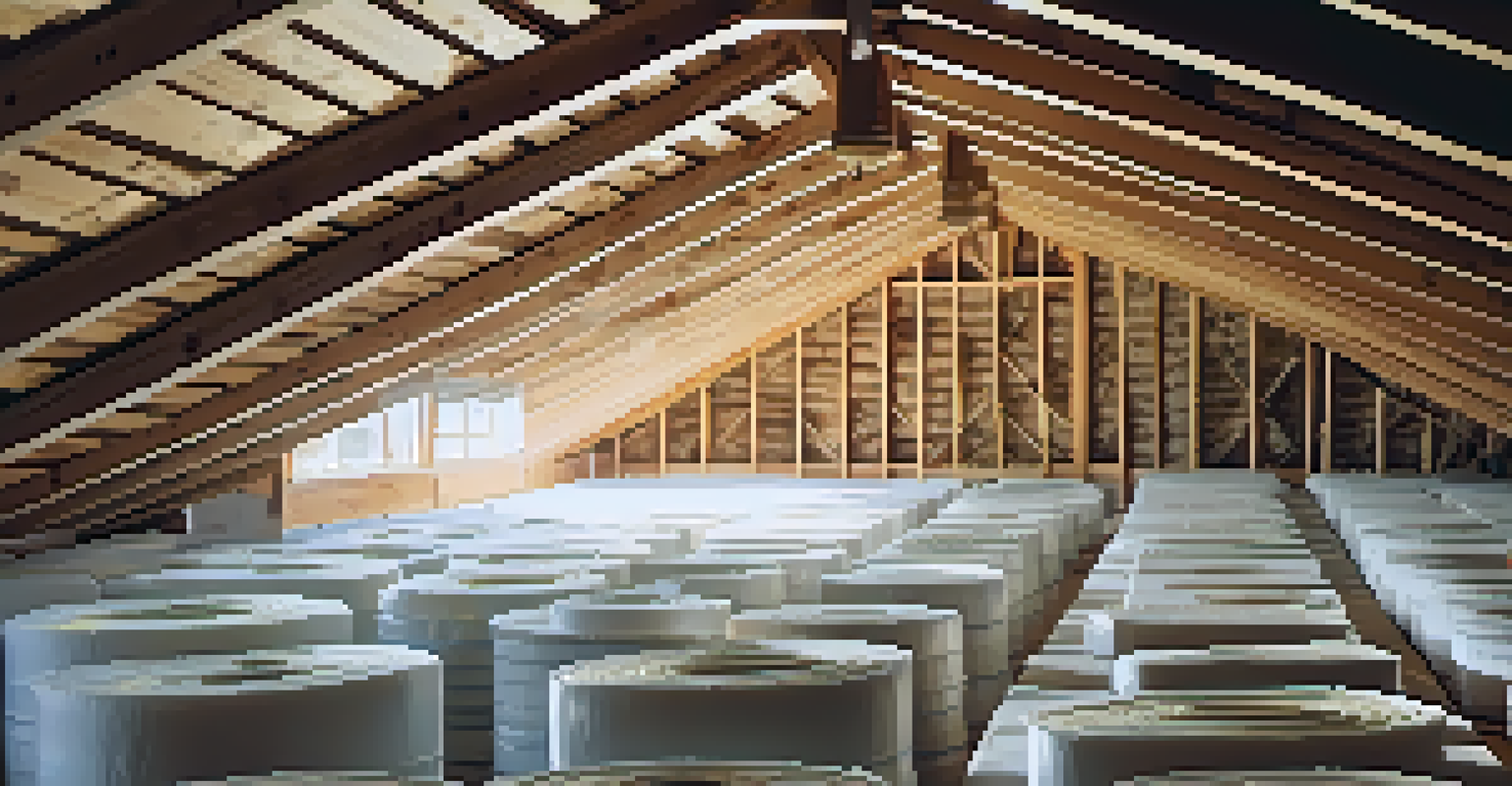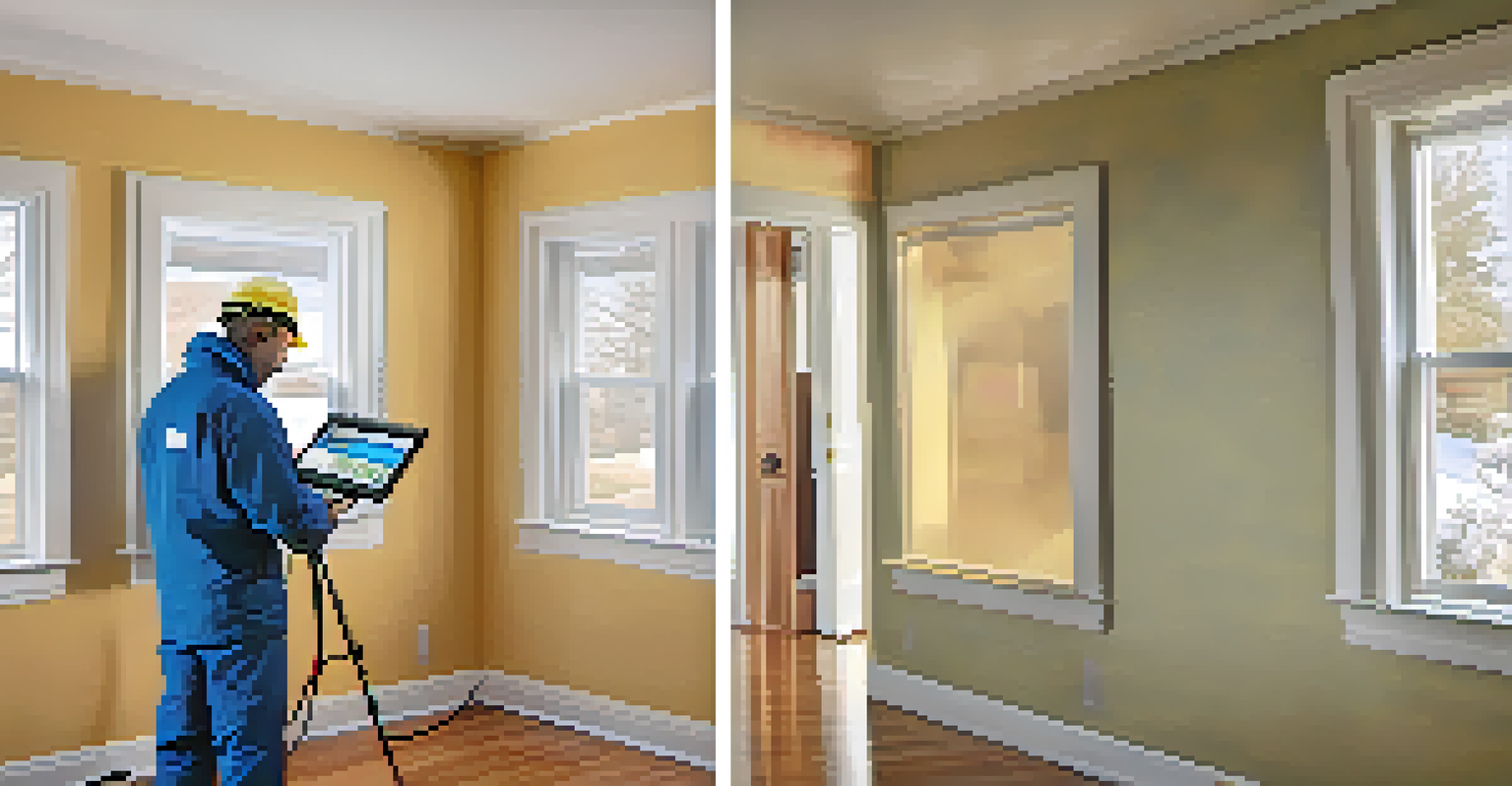Home Insulation: Key to Energy Efficiency and Comfort

Understanding Home Insulation and Its Importance
Home insulation is a critical component that helps maintain a comfortable indoor temperature throughout the year. By reducing heat transfer, insulation keeps your home warm in winter and cool in summer, creating a cozy environment. It's not just about comfort; effective insulation also plays a significant role in energy efficiency, making it a smart investment for any homeowner.
Insulation is the silent guardian of your home's comfort and efficiency.
When your home is well-insulated, you rely less on heating and cooling systems, leading to lower energy bills. This efficiency means your appliances work less hard, extending their lifespan and reducing maintenance costs. Furthermore, better insulation contributes to a healthier environment by decreasing greenhouse gas emissions from energy production.
In essence, insulation acts as a barrier against outdoor temperature fluctuations. It maximizes your home's energy efficiency while minimizing your environmental impact. Understanding its importance is the first step in creating a comfortable and sustainable living space.
Types of Insulation: Finding the Right Fit for Your Home
There are several types of insulation available, each with unique benefits and applications. Common options include fiberglass, foam board, and spray foam, each offering different levels of R-value, which measures insulation effectiveness. Choosing the right type depends on your home's specific needs, climate, and budget.

For instance, fiberglass insulation is popular due to its affordability and effectiveness. It's often used in attics and walls, providing a good balance between cost and performance. On the other hand, spray foam insulation offers superior air sealing capabilities, making it ideal for hard-to-reach areas.
Home Insulation Enhances Comfort
Effective insulation maintains a comfortable indoor temperature and reduces reliance on heating and cooling systems.
When selecting insulation, consider factors such as installation ease, moisture resistance, and fire safety. A thorough evaluation of these options will help you make an informed decision that enhances your home's energy efficiency.
The Benefits of Proper Home Insulation
Proper home insulation provides a multitude of benefits beyond just comfort. First and foremost, it significantly reduces energy costs, which can result in substantial savings over time. When your home is insulated effectively, your heating and cooling systems don’t have to work as hard, leading to lower utility bills.
Good insulation can save you money, keep you comfortable, and protect the environment.
Additionally, good insulation improves indoor air quality by minimizing drafts and preventing moisture buildup. This reduces the likelihood of mold growth and creates a healthier living environment for you and your family. In many cases, it can also enhance the resale value of your home, making it a wise investment.
Ultimately, the benefits of proper insulation extend far beyond financial savings. It contributes to a more sustainable lifestyle, comfort, and potential health improvements, making it an essential aspect of home maintenance.
How to Identify Insulation Needs in Your Home
Identifying your insulation needs starts with a thorough inspection of your home. Look for common signs of inadequate insulation, such as drafty rooms, uneven temperatures, or high energy bills. These indicators can signal that your insulation may not be performing effectively.
You can also check areas like attics, basements, and crawl spaces, where insulation is often lacking or improperly installed. If you notice bare spots or compressed insulation, these areas may require attention. Additionally, consider having a professional energy audit conducted to pinpoint specific insulation deficiencies.
Proper Insulation Saves Money
Well-insulated homes lead to lower energy bills and reduced maintenance costs, making insulation a smart investment.
Taking the time to assess your home's insulation needs is an important first step toward improving energy efficiency. By identifying weaknesses, you can make informed decisions about upgrades or repairs, leading to a more comfortable home.
DIY Insulation Projects: What You Need to Know
Many homeowners take on DIY insulation projects to save money and improve their homes. Simple tasks like adding insulation to attics or sealing gaps with caulk can be manageable and rewarding. However, it's essential to understand your capabilities and the materials involved before diving in.
When choosing a DIY project, start with areas that are easily accessible and where small improvements can lead to significant results. For example, sealing air leaks around windows and doors is a straightforward task that can dramatically enhance comfort and efficiency. Always use appropriate safety gear and follow guidelines to ensure a successful project.
While DIY projects can be cost-effective, don’t hesitate to call in professionals for more complex installations. Certain insulation types, like spray foam, require specialized equipment and expertise. Balancing DIY efforts with professional help can yield the best results for your home.
The Role of Professional Insulation Services
While DIY insulation projects can be effective, professional insulation services bring expertise and experience that can often save you time and money in the long run. Professionals understand the nuances of insulation types, local building codes, and best practices for installation. Their insights can help ensure that your insulation is done correctly and efficiently.
Hiring professionals also means you can take advantage of specialized equipment that may not be available to the average homeowner. They can conduct thorough assessments, identify hidden issues, and implement solutions that maximize your home's energy efficiency. This expertise can prevent costly mistakes that might arise from a DIY approach.
Professional Help Ensures Quality
Hiring insulation professionals can prevent costly mistakes and ensure proper installation for maximum energy efficiency.
Ultimately, investing in professional insulation services can lead to improved comfort, enhanced energy efficiency, and peace of mind knowing that your home is well-protected. It’s a choice that often pays off in the form of lower energy bills and a healthier living environment.
Maintaining Your Home Insulation for Longevity
Maintaining your home insulation is crucial for ensuring its longevity and effectiveness. Regular inspections of your insulation can help you catch any issues early, such as moisture buildup or pest infestations, which can compromise performance. Keeping an eye on these factors ensures that your insulation continues to provide the benefits you expect.
Additionally, be proactive about sealing any gaps or cracks that may develop over time. Weather changes can cause materials to expand and contract, leading to potential leaks. Regular maintenance not only enhances insulation performance but also contributes to overall home energy efficiency.

Incorporating routine checks and maintenance into your home care regimen will ensure that your insulation remains an effective barrier against temperature fluctuations. This proactive approach saves money and contributes to a comfortable, energy-efficient environment.